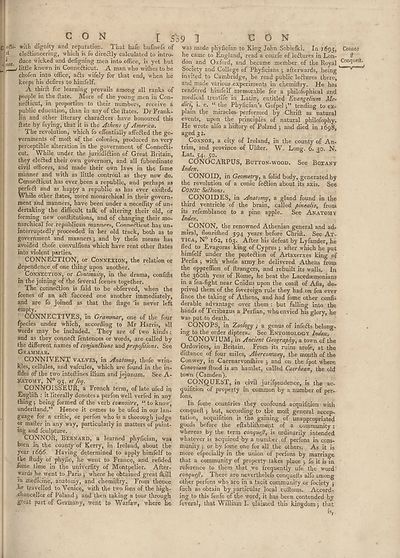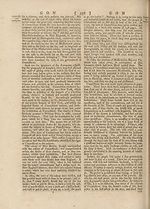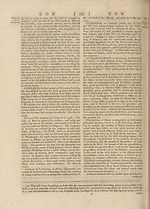Encyclopaedia Britannica, or, a Dictionary of arts, sciences, and miscellaneous literature : enlarged and improved. Illustrated with nearly six hundred engravings > Volume 6, CHI-Crystallization
(605) Page 559
Download files
Complete book:
Individual page:
Thumbnail gallery: Grid view | List view

CON
e<fti- with dignity and reputation. That hafe bufinefs of
lt eleftioneering, which is fo diredtly calculated to intro-
^ duce wicked and defigning men into office, is yet but
' little known in Connedticut. A man who wiffies to be
chofen into office, a£ts wdfely for that end, when he
keeps his defires to himfelf.
A third: for learning prevails among all ranks of
people in the date. More of the young men in Con-
nedticut, in proportion to their numbers, receive a
public education, than in any of the dates. Dr Frank¬
lin and other literary charadters have honoured this
date by faying, that it is the Athens of America.
The revolution, which fo effentially affedted the go¬
vernments of mod of the colonies, produced no very
perceptible alteration in the government of Connedti-
cut. While under the jurifdidtion of Great Britain,
they eledted their own governors, and all fubordinate
civil officers, and made their own laws in the fame
manner and with as little controul as they now do.
Connedlicut has ever been a republic, and perhaps as
perfedl and as happy a republic as has ever exided.
While other dates, more monarchical in their govern¬
ment and manners, have been under a neceffity of un¬
dertaking the difficult talk of altering their old, or
forming new conditutions, and of changing their mo¬
narchical for republican manners, Connedticut has un¬
interruptedly proceeded in her old track, both as to
government and manners j and by thefe means has
avoided thofe convulfions which have rent other dates
into violent parties.
CONNECTION, or Connexion, the relation or
dependence of one thing upon another.
Connection, or Continuity, in the drama, confids
in the joining of the feVeral fcenes together.
The connection is faid to be obferved, when the
fcenes of an adt fucceed one another immediately,
and are fo joined as that the dage is never left
empty.
CONNECTIVES, in Grammar, one of the four
fpecies under which, according to Mr Harris, all
words may be included. They are of two kinds :
and as they connedt fentences or words, are called by
the different names of conjunElions and prepofitions. See
Grammar.
CONNIVENT valves, in Anatomy, thofe wrin¬
kles, cellules, and vafcules, which are found in the in-
ddes of the two intedines ilium and jejunum. See A-
NATOMY, N° 93. et feq.
CONNOISSEUR, a French term, of late ufed in
Engliffi : it literally denotes a perfon well verfed in any
thing ; being formed of the verb connoitre, “ to knowf,
underdand.” Hence it comes to be ufed in our lan¬
guage for a critic, or perfon who is a thorough judge
or mader in any way, particularly in matters of paint¬
ing and fculpture.
CONNOR, Bernard, a learned phydcian, was
born in the county of Kerry, in Ireland, about the
year 1666, Having determined to apply himfelf to
the dudy of phydc, he w’ent to France, and redded
fome time in the univerdty of Montpelier. After¬
wards he went to Paris j where he obtained great Ikill
m medicine, anatomy, and chemidry. From thence
he travelled to Venice, with the two fons of the high-
chancellor of Poland ; and then taking a tour through
great part of Germany, went to Waifaw, where he
CON
was made phydcian to King John Sobielki. In 1695, Connor
he came to England, read a courfe of leftures in Lon- If
don and Oxford, and became member of the Royal C011'!116**-
Society and College of Phydcians ; afterwards, being
invited to Cambridge, he read public lectures there,
and made various experiments in chemidry. He has
rendered himfelf memorable for a philofophical and
medical treatife in Latin, entitled Evangelium Me-
diet, i. e. “ the Phydcian’s Gofpel j” tending to ex¬
plain the miracles performed by Chrid as natural
events, upon the principles of natural philofophy.
He wrote alfo a hidory of Poland j and died in 1698,
aged 3 2.
Connor, a city of Ireland, in the county of An¬
trim, and province of Ulder. W. Long. 6. 30. N.
Lat. 54. 50.
CONOCARPUS, Button-wood. See Botany
Index.
CONOID, in Geometry, a folid body, generated by
the revolution of a conic feftion about its axis. See
Conic Se&ions.
CONOIDES, in Anatomy, a gland found in the
third ventricle of the brain, called pinealis, from
its refemblance to a pine apple. See Anatomy
Index.
CONON, the renowned Athenian general and ad¬
miral, flouriffied 394 years before Chrid. See At¬
tica, N° 162, 163. After his defeat by Lyfander, he
fled to Evagoras king of Cyprus ; after which he put
himfelf under the prote&ion of Artaxerxes king of
Perda } with whofe army he delivered Athens from
the oppreffion of drangers, and rebuilt its walls. In
the 360th year of Rome, he beat the Lacedaemonians
in a fea-dght near Cnidus upon the coad of Ada, de¬
prived them of the fovereign rule they had on fea ever
dnee the taking of Athens, and had fome other cond^
derable advantage over them : but falling into the
hands of Teribazus a Perdan, who envied his glory, he
was put to death.
CONOPS, in Zoology ; a genus of infefts belong¬
ing to the order diptera. See Entomology Index.
CONOVIUM, in Ancient Geography, a town cf the
Ordovices, in Britain. From its ruins arofe, at the
didance of four miles, Aberconwey, the mouth of the
Conwey, in Caernarvonfhire j and on the fpot where
Conovium dood is an hamlet, called Caerhean, the old
town (Camden).
CONQUEST, in civil jurifprudence, is the ac-
quidtion of property in common by a number of per-
fons.
In fome countries they confound acquidtion with
conqued ; but, according to the mod general accep¬
tation, acquidtion is the gaining of unappropriated
goods before the edablidiment of a community :
whereas by the term conquejl, is ordinarily intended
whatever is acquired by a number cf perfons in com¬
munity or by fome one for all the others. As it is
more efpecially in the union of perfons by marriage
that a community of property takes place •, fo it is in
reference to them that we frequently ufe the word'
conqueji. There are neverthelefs conqueds alfo among
other perfons who are in a tacit community or fociety j
fuch as obtain by particular local cudoms. Accord¬
ing to this fenfe of the word, it has been contended by
feveral, that William I. claimed this kingdom; that
I 5'59 1
e<fti- with dignity and reputation. That hafe bufinefs of
lt eleftioneering, which is fo diredtly calculated to intro-
^ duce wicked and defigning men into office, is yet but
' little known in Connedticut. A man who wiffies to be
chofen into office, a£ts wdfely for that end, when he
keeps his defires to himfelf.
A third: for learning prevails among all ranks of
people in the date. More of the young men in Con-
nedticut, in proportion to their numbers, receive a
public education, than in any of the dates. Dr Frank¬
lin and other literary charadters have honoured this
date by faying, that it is the Athens of America.
The revolution, which fo effentially affedted the go¬
vernments of mod of the colonies, produced no very
perceptible alteration in the government of Connedti-
cut. While under the jurifdidtion of Great Britain,
they eledted their own governors, and all fubordinate
civil officers, and made their own laws in the fame
manner and with as little controul as they now do.
Connedlicut has ever been a republic, and perhaps as
perfedl and as happy a republic as has ever exided.
While other dates, more monarchical in their govern¬
ment and manners, have been under a neceffity of un¬
dertaking the difficult talk of altering their old, or
forming new conditutions, and of changing their mo¬
narchical for republican manners, Connedticut has un¬
interruptedly proceeded in her old track, both as to
government and manners j and by thefe means has
avoided thofe convulfions which have rent other dates
into violent parties.
CONNECTION, or Connexion, the relation or
dependence of one thing upon another.
Connection, or Continuity, in the drama, confids
in the joining of the feVeral fcenes together.
The connection is faid to be obferved, when the
fcenes of an adt fucceed one another immediately,
and are fo joined as that the dage is never left
empty.
CONNECTIVES, in Grammar, one of the four
fpecies under which, according to Mr Harris, all
words may be included. They are of two kinds :
and as they connedt fentences or words, are called by
the different names of conjunElions and prepofitions. See
Grammar.
CONNIVENT valves, in Anatomy, thofe wrin¬
kles, cellules, and vafcules, which are found in the in-
ddes of the two intedines ilium and jejunum. See A-
NATOMY, N° 93. et feq.
CONNOISSEUR, a French term, of late ufed in
Engliffi : it literally denotes a perfon well verfed in any
thing ; being formed of the verb connoitre, “ to knowf,
underdand.” Hence it comes to be ufed in our lan¬
guage for a critic, or perfon who is a thorough judge
or mader in any way, particularly in matters of paint¬
ing and fculpture.
CONNOR, Bernard, a learned phydcian, was
born in the county of Kerry, in Ireland, about the
year 1666, Having determined to apply himfelf to
the dudy of phydc, he w’ent to France, and redded
fome time in the univerdty of Montpelier. After¬
wards he went to Paris j where he obtained great Ikill
m medicine, anatomy, and chemidry. From thence
he travelled to Venice, with the two fons of the high-
chancellor of Poland ; and then taking a tour through
great part of Germany, went to Waifaw, where he
CON
was made phydcian to King John Sobielki. In 1695, Connor
he came to England, read a courfe of leftures in Lon- If
don and Oxford, and became member of the Royal C011'!116**-
Society and College of Phydcians ; afterwards, being
invited to Cambridge, he read public lectures there,
and made various experiments in chemidry. He has
rendered himfelf memorable for a philofophical and
medical treatife in Latin, entitled Evangelium Me-
diet, i. e. “ the Phydcian’s Gofpel j” tending to ex¬
plain the miracles performed by Chrid as natural
events, upon the principles of natural philofophy.
He wrote alfo a hidory of Poland j and died in 1698,
aged 3 2.
Connor, a city of Ireland, in the county of An¬
trim, and province of Ulder. W. Long. 6. 30. N.
Lat. 54. 50.
CONOCARPUS, Button-wood. See Botany
Index.
CONOID, in Geometry, a folid body, generated by
the revolution of a conic feftion about its axis. See
Conic Se&ions.
CONOIDES, in Anatomy, a gland found in the
third ventricle of the brain, called pinealis, from
its refemblance to a pine apple. See Anatomy
Index.
CONON, the renowned Athenian general and ad¬
miral, flouriffied 394 years before Chrid. See At¬
tica, N° 162, 163. After his defeat by Lyfander, he
fled to Evagoras king of Cyprus ; after which he put
himfelf under the prote&ion of Artaxerxes king of
Perda } with whofe army he delivered Athens from
the oppreffion of drangers, and rebuilt its walls. In
the 360th year of Rome, he beat the Lacedaemonians
in a fea-dght near Cnidus upon the coad of Ada, de¬
prived them of the fovereign rule they had on fea ever
dnee the taking of Athens, and had fome other cond^
derable advantage over them : but falling into the
hands of Teribazus a Perdan, who envied his glory, he
was put to death.
CONOPS, in Zoology ; a genus of infefts belong¬
ing to the order diptera. See Entomology Index.
CONOVIUM, in Ancient Geography, a town cf the
Ordovices, in Britain. From its ruins arofe, at the
didance of four miles, Aberconwey, the mouth of the
Conwey, in Caernarvonfhire j and on the fpot where
Conovium dood is an hamlet, called Caerhean, the old
town (Camden).
CONQUEST, in civil jurifprudence, is the ac-
quidtion of property in common by a number of per-
fons.
In fome countries they confound acquidtion with
conqued ; but, according to the mod general accep¬
tation, acquidtion is the gaining of unappropriated
goods before the edablidiment of a community :
whereas by the term conquejl, is ordinarily intended
whatever is acquired by a number cf perfons in com¬
munity or by fome one for all the others. As it is
more efpecially in the union of perfons by marriage
that a community of property takes place •, fo it is in
reference to them that we frequently ufe the word'
conqueji. There are neverthelefs conqueds alfo among
other perfons who are in a tacit community or fociety j
fuch as obtain by particular local cudoms. Accord¬
ing to this fenfe of the word, it has been contended by
feveral, that William I. claimed this kingdom; that
I 5'59 1
Set display mode to:
![]() Universal Viewer |
Universal Viewer | ![]() Mirador |
Large image | Transcription
Mirador |
Large image | Transcription
Images and transcriptions on this page, including medium image downloads, may be used under the Creative Commons Attribution 4.0 International Licence unless otherwise stated. ![]()
| Permanent URL | https://digital.nls.uk/193015288 |
|---|
| Attribution and copyright: |
|
|---|
| Description | Ten editions of 'Encyclopaedia Britannica', issued from 1768-1903, in 231 volumes. Originally issued in 100 weekly parts (3 volumes) between 1768 and 1771 by publishers: Colin Macfarquhar and Andrew Bell (Edinburgh); editor: William Smellie: engraver: Andrew Bell. Expanded editions in the 19th century featured more volumes and contributions from leading experts in their fields. Managed and published in Edinburgh up to the 9th edition (25 volumes, from 1875-1889); the 10th edition (1902-1903) re-issued the 9th edition, with 11 supplementary volumes. |
|---|---|
| Additional NLS resources: |
|

